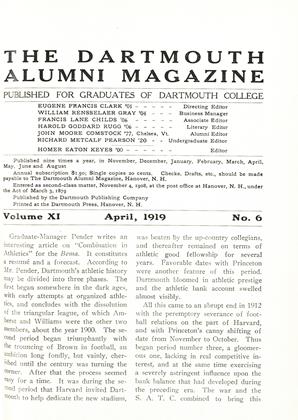Dartmouth men played a prominent part in the brief, business-like and result producing session of the New Hampshire Legislature, which ended on March 28. Governor John H. Bartlett '94, presented to the General Court in his inaugural message a forward-looking program of extensive reconstruction, which was enacted into law to a far greater extent than any similar series of proposals in recent years.
His most important radical recommendation was that for a new educational law, whereby every public school in the state must attain and retain a required standard of efficiency under trained supervision and with qualified in" struction, thus equalizing the educational opportunities of city and country to a degree hitherto impossible. The Americanization of aliens and the cure of illiteracy are provided for in ways which have made the new law the subject of inquiry from all parts of the country. Because of the considerably increased expense which the new law will entail upon the state treasury and upon the individual school districts it was expected that the measure would meet with opposition in the Legislature; but it passed both the House of Representatives and the Senate unanimously and without amendment.
This remarkable result was due in large part to the confidence which the legislators and their constituents felt in the proponents of the measure, Governor Bartlett and the committee which he had chosen to advise with him on this particular subject. This committee was made up of General Frank S. Streeter '74, President Ernest M. Hopkins '01, Judge John E. Young '78, Superintendent Herbert F. Taylor '94, Rev. Fr. Patrick J. Scott, Wilfrid J. Lessard and Dr. Alpha H. Harriman; and no one will dissent from the statement that the victory was won largely through the unremitting efforts of General Streeter, who used President Hopkins as his chief weapon of offense and defense.
Hon. Ernest W. Butterfield '97, state superintendent of public instruction, worked without ceasing for the success of the new law, in which his own aims and ideals and those of his predecessor in office, Hon. Henry C. Morrison '95, will be realized in large degree.
Although the financial situation made it necessary to scrutinize with the utmost care every request for funds from the state treasury, the usual appropriation of $15,000 a year for Dartmouth College was-made without a voice or a vote in opposition.
Another law enacted without question provides that "the trustees of Dartmouth College are hereby authorized to use for the general purposes of the college so much of the avails and income of the land granted to them by the state by an act of the legislature approved June 1807, as may not reasonably be required for the purposes specifically declared in said granty—namely the education of indigent youths and the alleviation of the expenses of necessitous families of such youths in this state. The restrictions of said act in conflict herewith are hereby waived and released until such time as the legislature may otherwise order."
Conditions were such that Dartmouth had no need to call upon her sons in the Legislature for service in her behalf; but if the necessity had arisen, there would have been a prompt response from these members of the House of Representatives: Dr. Charles A. Fairbanks '71, of Dover; William C. Clarke '76, of Manchester; Dr. C. B. Drake '83, of Lebanon; Prof. J. H. Blaisdell '85, of Laconia; George W. Fowler 'B6, of Pembroke; Sherman Hobbs '89, of Pelham; Benjamin W. Couch '96, of Concord; Major Eugene W. Leach '01, of Concord; A. P. Fairfield '00, of Hanover; Forrest J. Hall '03, of Keene; Jesse L. Thorpe '03, of Lisbon; Thomas J. Leonard '10, of Nashua; and William N. Rogers '15, of Wakefield.
 View Full Issue
View Full Issue
More From This Issue
-
 Article
ArticleMILITARY NEWS
April 1919 -
 Article
ArticleANNUAL MEETING OF THE DARTMOUTH SECRETARIES ASSOCIATION
April 1919 -
 Class Notes
Class NotesCLASS OF 1899
April 1919 By George G. Clark -
 Article
ArticleMORNING SESSION
April 1919 -
 Article
ArticleDINNER SESSION
April 1919 -
 Article
ArticleGraduate-Manager Pender writes an interesting article on "Combination in Athletics" for the Bema.
April 1919











